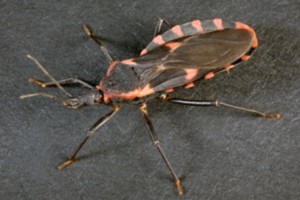A tiny bug with a potentially deadly bite (or ‘kiss’) is continuing its spread up the East Coast of the US.
The latest confirmed case was confirmed in Delaware this past week;
The bugs can carry a deadly disease known as Chagas, though the chances of contracting it are low. https://t.co/wnHzZlIvfO pic.twitter.com/xrkq9Tgfxf
— USA TODAY (@USATODAY) April 24, 2019
 The American Heart Association has recently released a report about the rise of the little insect in southern states.
The American Heart Association has recently released a report about the rise of the little insect in southern states.
According to the report, a number of species of Triatomine insects (aka ‘kissing bugs’) have been spreading the Chagas disease across southern states. “Chagas disease, caused by infection with a parasite called Trypanosoma cruzi (T cruzi), causes chronic heart disease in about one-third of those infected. Over the past 40 years, Chagas disease has spread to areas where it had not traditionally been seen,” the report notes.
There are at least two species of ‘kissing bugs’ that are native to North Carolina: Triatoma sanguisuga and T. lecticularia.
The ‘kissing bug’ bites sleeping people on their face, usually near the eyes or mouths, hence the nickname. The bugs then defecate at the site of the bite, essentially injecting their feces into the wound. If the bug was infected with T. cruzi, an infection of the Chagas disease will follow.
According to the CDC, Acute Chagas disease occurs immediately after infection, may last up to a few weeks or months, and parasites may be found in the circulating blood. Infection may be mild or asymptomatic. There may be fever or swelling around the site of inoculation (where the parasite entered into the skin or mucous membrane). Rarely, acute infection may result in severe inflammation of the heart muscle or the brain and lining around the brain.
Following the acute phase, most infected people enter into a prolonged asymptomatic form of disease (called “chronic indeterminate”) during which few or no parasites are found in the blood. During this time, most people are unaware of their infection. Many people may remain asymptomatic for life and never develop Chagas-related symptoms. However, an estimated 20 – 30% of infected people will develop debilitating and sometimes life-threatening medical problems over the course of their lives.
Complications of chronic Chagas disease may include:
- heart rhythm abnormalities that can cause sudden death;
- a dilated heart that doesn’t pump blood well;
- a dilated esophagus or colon, leading to difficulties with eating or passing stool.
The infectious ‘kissing bugs’ tend to live around damp and dark indoors spaces, in cracks and holes of substandard housing, or in a variety of outdoor settings including:
- Beneath porches
- Between rocky structures
- Under cement
- In rock, wood, brush piles, or beneath bark
- In rodent nests or animal burrows
- In outdoor dog houses or kennels
- In chicken coops or houses
The CDC notes that pyrethrin sprays have been found effective in eliminating kissing bug infestations around homes and outbuildings.
There are multiple look-alikes, including some non-triatomine reduviid bugs, that don’t feed on human blood. They include the wheel bug and the western corsair. Some plant-feeding bugs, such as the leaf-footed bug, also resemble the triatomine.
If you think you’ve encountered a kissing bug, trap the bug in a plastic or glass container, doing your best not to touch it. You can then either fill the container with rubbing alcohol or freeze it, then take the bug to your area health department or university lab for proper identification.
